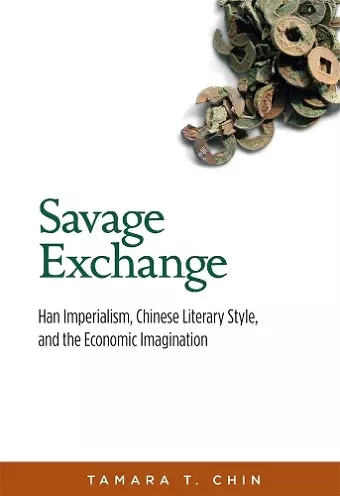Savage Exchange
Han Imperialism, Chinese Literary Style, and the Economic Imagination
Format:Paperback
Publisher:Harvard University, Asia Center
Published:29th May '20
Should be back in stock very soon

Savage Exchange explores the politics of representation during the Han dynasty (206 BCE–220 CE) at a pivotal moment when China was asserting imperialist power on the Eurasian continent and expanding its local and long-distance (“Silk Road”) markets. Tamara T. Chin explains why rival political groups introduced new literary forms with which to represent these expanded markets. To promote a radically quantitative approach to the market, some thinkers developed innovative forms of fiction and genre. In opposition, traditionalists reasserted the authority of classical texts and advocated a return to the historical, ethics-centered, marriage-based, agricultural economy that these texts described. The discussion of frontiers and markets thus became part of a larger debate over the relationship between the world and the written word. These Han debates helped to shape the ways in which we now define and appreciate early Chinese literature and produced the foundational texts of Chinese economic thought. Each chapter in the book examines a key genre or symbolic practice (philosophy, fu-rhapsody, historiography, money, kinship) through which different groups sought to reshape the political economy. By juxtaposing well-known texts with recently excavated literary and visual materials, Chin elaborates a new literary and cultural approach to Chinese economic thought.
Every now and then, the collective scholarly consciousness is stirred up by a new book that makes unexpected connections among well-known ‘facts’ and thereby fundamentally changes the perception of an entire epoch. Tamara Chin’s Savage Exchange is such a book. -- Lothar von Falkenhausen * Journal of Chinese Studies *
Savage Exchange is a major breakthrough in conceptualizing grounds of comparison between early Chinese texts and other literary traditions. By drawing attention to a range of texts often outside the purview of literary scholars, Tamara Chin rethinks the relationship between centers and margins in the Chinese tradition. How did knowledge of distant lands or other peoples shape literary imagination? How can we extend the concept of ‘text’ to material remains (such as coins)? By asking these and other absorbing questions, Chin reveals hidden connections between what at first sight appear to be disparate fields of knowledge. -- Wai-yee Li, Harvard University
This book offers an utterly refreshing look at the entanglement of the economic and literary in ancient Chinese writings about exotica, foreign markets, aesthetic extravagance, and border crossing in general. Tamara Chin’s masterful exegesis ranges across the Shiji, the Hanshu, the Guanzi, and fu-rhapsody to reveal an ancient world that is at once new yet surprisingly familiar in its anxieties about lavish expenditure, quantification, economic abstraction, strange idioms, accumulations of wealth and their moral implications. Savage Exchange is a brilliant contribution to classical scholarship, comparative literature, and comparative analyses of ancient economic thought. -- Lydia H. Liu, Columbia University
Tamara Chin vividly illuminates the imbrication of rhetorical idioms, literary styles, and theories of value that shaped the clash between moral philosophy and political economy at a defining moment in the construction of the Chinese empire. Savage Exchange initiates an immensely rewarding dialogue between literary analysis and economic history. -- Richard von Glahn, University of California, Los Angeles
- Winner of Harry Levin Prize 2016
- Winner of ICAS Book Prize 2017
- Commended for Joseph Levenson Book Prize 2016
- Nominated for James Henry Breasted Prize 2015
ISBN: 9780674244528
Dimensions: 229mm x 152mm x 23mm
Weight: 499g
384 pages